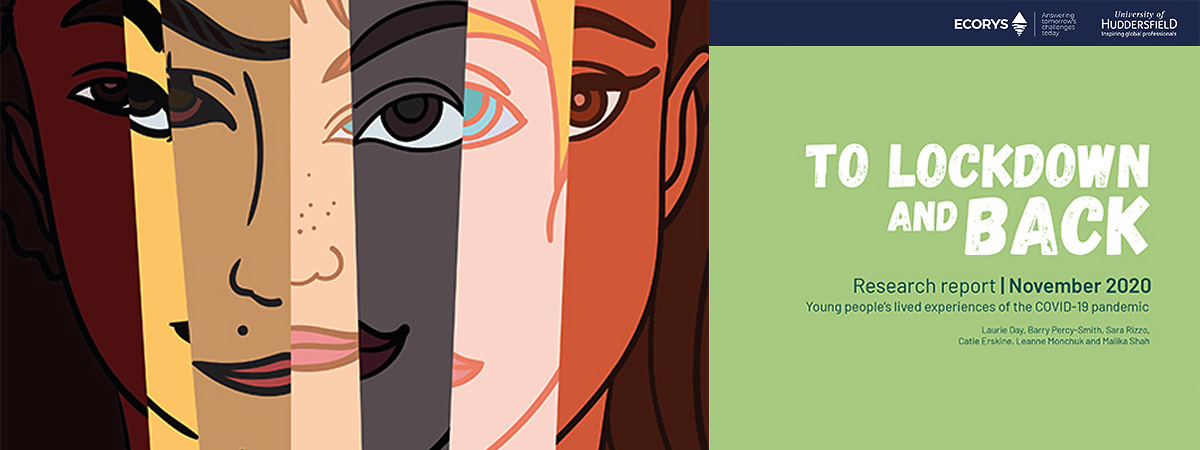An international study titled: To Lockdown and back: young people’s lived experience of the COVID-19 pandemic says young people’s perspectives on COVID-19 recovery is being overshadowed by negative ‘victim or villain’ narratives
Decision-makers are failing to harness young people’s potential to help shape pandemic responses, according to a major study that features the views of young people around the world.
The report, titled: To lockdown and back: young people’s lived experience of the COVID-19 pandemic reveals the impact of the virus’ first wave on 14-to-18-year-olds from seven countries, including the UK, from the perspectives of young people.
The study, which includes the expertise of the University’s Professor Barry Percy-Smith and researcher Dr Leanne Monchuk, is the initial report from the 18-month Growing up Under COVID-19 project.
Funded by the Nuffield Foundation and conducted with the independent research institute Ecorys, the study explores how young people experience the crisis and outlines how to promote their rights and wellbeing during and after the pandemic.
“This really is the time for us to start taking young people seriously, listen to what they are telling us, value their contributions and support their involvement as a force for change.”
As well as arguing that their experiences could drive more inclusive, democratic COVID-19 approaches, the report shows their rights have been marginalised through lack of access to quality education, healthcare, and other services.
The international study says that political, public and media discourses feature young people as ‘victims’ of educational upheaval or rule-breaking ‘villains’. Yet this population is overlooked in decisions about how the pandemic is handled.
Professor Percy-Smith, who is the Director of the University’s Centre for Applied Childhood, Youth and Family Research, said the Centre is committed to research that makes a difference in the lives of young people and families.
“So often research messages are reported to adult decision-makers in the hope they will listen and respond. But what happens when politicians don’t listen to what young people are saying?”, said Professor Percy-Smith.
“In this report, with their insightful observations and commentaries, young people are telling us how politicians and public officials so often are failing to act in the best interests of children and young people.
“This really is the time for us to start taking young people seriously, listen to what they are telling us, value their contributions and support their involvement as a force for change. This report and the research will contribute to that endeavour,” he added.

The research involved 70 young people from the four UK nations and Italy, Singapore and Lebanon. The diverse participants, who contributed to the study between July and September 2020, included BAME, LGBTQ+ young people and teenagers with experience of care or mental health issues.
Each participant was mentored by the project team to undertake research and commentary on the crisis, according to their own priorities and terms of reference. Thus meaning, they were not solely seen as research subjects but as active ‘experts by experience’.
Findings of the study
While there were differences between the seven countries, the young people shared a common frustration towards the media for dismissing younger people as irresponsible in contrast to examples of individuals embracing volunteering or greater family responsibility.
“I think there's been a lot of this about, ‘oh young people feel like they're invincible so they're not socially distancing’… and I think it's quite a generalisation from unfair stereotypes about young people.”
Anonymous participant
There were significant concerns about how politicians ignore younger people and why there was a lack of opportunity to speak out about their experiences in strategies decided by local schools or services. For example, participants had to be over the age of 18 to ask a question in the televised COVID-19 briefings.
There was also disappointment in participatory processes such as youth councils or surveys due to their failure to impact on a national level.
“We were saying, 'Well, young people have questions, too’; why can't we? There's been no address to us, we can't ask questions. Where are we at all in this pandemic?”
Anonymous participant
The report also discovered the polarising impact of COVID-19. As some teenagers experienced moments of self-reflection and resilience, others struggled with a lack of support services. The need for an holistic strategy when managing global public health emergencies was also made clear.
Lessons to be learnt
Ultimately moving forward, the report suggests government and public authorities must improve young people’s representation on participatory platforms and review access to support. Furthermore, it challenges schools, youth organisations and service providers to review opportunities intended for engaging young people in decision-making.
The report highlights the importance of removing negative stereotypes and says the media need to balance the portrayal of young people during the pandemic, from involving them in reporting roles, to covering their personal stories.
Two further reports are scheduled for spring and autumn 2021, with the project set to conclude a month later. Additional outputs and communications from young people will also be released throughout the year.
More news from the Centre for Applied Childhood, Youth and Family Research
More news from the Centre for Applied Childhood, Youth and Family Research - 0 articles matching your search
More news from the Centre for Applied Childhood, Youth and Family Research - 1 article matching your search
More news from the Centre for Applied Childhood, Youth and Family Research - {{numberOfPosts}} articles matching your search

